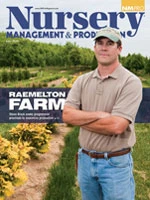.jpg) Todd Davis Todd Davis |
I really shouldn’t do this. Sitting down and writing about the collapse of Skinner Nurseries at this time is a really bad idea.
For one, it feels like the corpse isn’t even cold yet. I should show a little respect, for crying out loud.
Secondly, I personally know creditors suing each and every person they can find remotely associated with Skinner Nurseries Inc. Why should I stick my neck out?
Note to litigation-happy folks owed a lot of money by my former employer: I know you’re upset, and you have a right to be. But I was just a salesperson. I’m broke too, and suing me won’t do you any good.
On a serious note, I truly would like to thank all the vendors that supplied material to Skinner Nurseries over the past few years. You carried the company on your backs. Your faith in Skinner kept it in business (and everyone that worked there employed) longer than it should have been.
I know many of you personally, and you are my friends. I am deeply sorry for what happened, and I hope each of you gets paid in full very quickly.
With that said, let me get on with my story. I’m compelled to tell you what attracted me to Skinner Nurseries three years ago.
The right idea
Skinner Nurseries was founded in 1973 and started building a chain of landscape distribution centers in the 1990s. It was built on a foundation that, if you empower employees and reward them when the company succeeds, you will achieve great things.
 Skinner was completely open book. I’ve worked at companies that were somewhat open book, with several chapters of the book off limits for prying eyes. But with Skinner you could look up everything with the exception of maybe employees’ salaries (and if you were smart enough and desperate enough to know, you probably could have figured that out too). Skinner was completely open book. I’ve worked at companies that were somewhat open book, with several chapters of the book off limits for prying eyes. But with Skinner you could look up everything with the exception of maybe employees’ salaries (and if you were smart enough and desperate enough to know, you probably could have figured that out too).
Managers were encouraged to go over the books weekly. Every worker knew the score. They knew if the company, and their individual branch, was winning or losing.
People were given goals, and when they reached those goals they were rewarded. Every employee in the yard knew if a plant was not watered and died, that was money right out of their profit sharing.
If you’re a business owner, there are two books that should be required reading: “Customers for Life” by Carl Sewell and “The Great Game of Business” by Jack Stack. When you’re done with these books, you’ll look at how you manage your staffs differently.
The same page
I have seen and worked at the most successful Skinner branches, and they were a sight to see. Everyone worked toward a common goal. Sales, customer service and efficiency were mantras, and if you weren’t on board you were called out by your peers.
At the successful branches, everyone from the managers to the hourly employees profited.
It was those ideals and sense of teamwork that attracted me to Skinner. It was something I wanted to be a part of.
I was also impressed that Skinner Nurseries was growing, but not too fast. I’d seen nursery conglomerations expand too quickly, overextend themselves and collapse. That wasn’t Skinner, I told myself.
Unfortunately, the company fell into that exact same trap.
There are those that will bask in the failure of Skinner Nurseries. Mock if you will, but take this home with you: The principles of Skinner Nurseries were sound.
You can use superior service to differentiate a distribution center in a market. And when all your employees wake up excited to come to work and help the nursery succeed, that’s a powerful thing. When you have the opposite, it’s a living hell.
|
.jpg) Todd Davis
Todd Davis
 Skinner was completely open book. I’ve worked at companies that were somewhat open book, with several chapters of the book off limits for prying eyes. But with Skinner you could look up everything with the exception of maybe employees’ salaries (and if you were smart enough and desperate enough to know, you probably could have figured that out too).
Skinner was completely open book. I’ve worked at companies that were somewhat open book, with several chapters of the book off limits for prying eyes. But with Skinner you could look up everything with the exception of maybe employees’ salaries (and if you were smart enough and desperate enough to know, you probably could have figured that out too).




